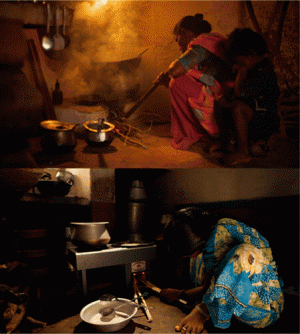Progress in introducing cleaner cook stoves for billions of people worldwide

It may be the 21st century, but nearly half the world's population still cooks and heats with open fires or primitive stoves that burn wood, animal dung, charcoal and other polluting solid fuels. The article in the ACS journal Environmental Science & Technology describes impressive progress being made to remedy that situation and the obstacles that remain.
Susan C. Anenberg and colleagues describe the health and environmental consequences of those old-fashioned energy sources. They include an estimated 4 million deaths annually from inhalation of soot and other material in the smoke, and air pollution that contributes to global warming. Reliance on wood and charcoal also contributes to deforestation and other problems. In a broadly based response, scientists, international aid agencies and governments have launched efforts to develop and introduce cleaner, more efficient cook stoves that may improve health and livelihoods and reduce climate emissions.
The article describes efforts to introduce millions of cleaner stoves into developing countries and to better understand the resulting benefits. Some new stoves, for instance, can cut fuel use by 30-60 percent, while reducing air pollution exposure and climate-warming pollution. It also discusses the importance of evaluating stove performance for a variety of policy goals and of ensuring that the new stoves are acceptable and affordable to users.
More information: Cleaner Cooking Solutions to Achieve Health, Climate, and Economic Cobenefits, Environ. Sci. Technol., Article ASAP DOI: 10.1021/es304942e
Abstract
Nearly half the world's population must rely on solid fuels such as biomass (wood, charcoal, agricultural residues, and animal dung) and coal for household energy, burning them in inefficient open fires and stoves with inadequate ventilation. Household solid fuel combustion is associated with four million premature deaths annually; contributes to forest degradation, loss of habitat and biodiversity, and climate change; and hinders social and economic progress as women and children spend hours every day collecting fuel. Several recent studies, as well as key emerging national and international efforts, are making progress toward enabling wide-scale household adoption of cleaner and more efficient stoves and fuels. While significant challenges remain, these efforts offer considerable promise to save lives, improve forest sustainability, slow climate change, and empower women around the world.
Journal information: Environmental Science & Technology
Provided by American Chemical Society


















